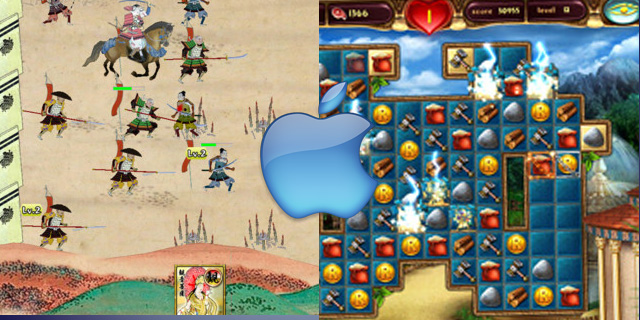
This week, we’re talking about a Japanese take on Plants vs. Zombies and a take on the Match-3 genre.
 Samurai BloodShow: les vagues blanches, les nuages rouges (Universal): While we’re certainly not in need of another standard tower defense game, we haven’t really seen a proliferation of the brand of defense created by PopCap with its Plants vs. Zombies. Sega’s here to help, though! Samurai BloodShow, while familiar in mechanics, takes a few interesting turns.
Samurai BloodShow: les vagues blanches, les nuages rouges (Universal): While we’re certainly not in need of another standard tower defense game, we haven’t really seen a proliferation of the brand of defense created by PopCap with its Plants vs. Zombies. Sega’s here to help, though! Samurai BloodShow, while familiar in mechanics, takes a few interesting turns.
First: the aesthetic. Everything here is like a traditional Japanese drawing come to life, with cutouts of samurai and other warriors warped and skewed in various ways for movement. Second: the deck-building mechanic. Rather than choosing a palette of units to send out, you acquire and draw cards to play in various slots. Winning a level gives you one more card, and striking a balance between unit variety (which allows you to be prepared for anything) and a concentrated attack (since playing duplicates in the same slot levels up units) is a compelling mechanic.
It has a few balance issues, the pace can be a bit slow and it takes a while to build a decent deck without in-app card purchases, but ultimately it’s still worth a shot. 4/5
 Cradle of Rome (iPad): There’s something about the Match-3 genre that keeps us playing, even when we know we should stop. Cradle of Rome, which has already had some success on PCs, does it with progression aspects: matching various items collects wood, stone and gold, and you use these to buy buildings, unlocking better items, acquiring power-ups and rebuilding Rome.
Cradle of Rome (iPad): There’s something about the Match-3 genre that keeps us playing, even when we know we should stop. Cradle of Rome, which has already had some success on PCs, does it with progression aspects: matching various items collects wood, stone and gold, and you use these to buy buildings, unlocking better items, acquiring power-ups and rebuilding Rome.
Most of the game’s focused around making matches in specific spots: rather than a score goal or a time, your objective is to make matches in all the blue squares to turn them white. Of course, it’s not that simple; light-blue squares need two matches, chained squares need to be matched once or twice to “unlock” them, and formations tend to make blocks fall in peculiar ways. Everything’s made bearable with the power-up system. Each level, one of the blocks feeds a power-up meter, and you can use it to delete blocks, transmute them or whatever the particular bonus happens to do. The thing, though: you can fill up that meter and save it for other levels, banking one use of each of the game’s power-ups for an all-out assault.
Ultimately, it kept us awake and matching, and that’s what we look for in the genre. 4/5



















